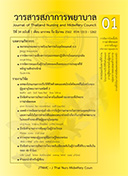Impacts of an Individualised Lifestyle Adjustment Programme on Glycosylated Haemoglobin Levels in Older People with Type-2 Diabetes
Keywords:
individualised lifestyle adjustment programme, glycosylated haemoglobin, older people with type-2 diabetesAbstract
Objective: To study what impacts an individualised lifestyle adjustment programme
could have on the levels of glycosylated haemoglobin in older people with type-2 diabetes.
Design: Two-group experimental research with a pre-test and a post-test.
Methodology: Through purposive sampling, 44 elderly type-2 diabetes patients were recruited as participants. All of the patients were receiving treatment at the diabetes clinics of two health-promoting hospitals in Chiang Mai province between October 2017 and March 2018. First, the participants were paired according to their similarities in age, sex, duration of diabetes, type of orally administered diabetes medication, and co-morbidity. Then, each pair was split, with one member assigned to the control group and the other to the experimental group. The experimental group received a 12-week individualised lifestyle adjustment programme, whilst the control group was given standard care. Data were collected before
and after the experiment, through a personal information questionnaire and a measurement of glycosylated haemoglobin level using the COBAS C501 machine. The data were analysed using descriptive statistics, independent t-test, and paired t-test.
Results: The decrease in glycosylated haemoglobin level was signifcantly greater (p < 0.05) in the experimental group than in the control group. Moreover, after completing the programme, the experimental group had a signifcantly lower glycosylated haemoglobin level than before participating in the programme (p < 0.001).
Recommendations: The results indicate that the individualised lifestyle adjustment programme could be used to effectively control the glycosylated haemoglobin levels in older people with type-2 diabetes.
Downloads
References
Nonthaburi: Aksorn Graphic & Design; 2557. (in Thai)
2. Holt RI, Cockram CS, Flyvbjerg A, Goldstein BJ. Text book of diabetes. 5th ed. British: A John Wiley& Sons; 2010.
3. Gallagher H, Suckling RJ. Diabetic nephropathy: where are we on the journey from pathophysiology to treatment. Diabetes Obes Metab 2016 Feb;18(1):641-7.
4. Kirkman MS, Briscoe VJ, Clark N, Florez H, Haas LB, Halter JB, et al. Diabetes in older adults. Diabetes Care 2012 Oct;35(12):2650-64.
5. Himathongkam T. Complete diabetes education. 8thed. Bangkok: Withayapat Company; 2009. (in Thai)
6. Meneilly GS, Tessier D. Diabetes in elderly adults. J Gerontol Med Sci 2001 Jan;56(1):5-13.
7. Rymkiewicz E, Rekas-Wojcik A, Milaniuk S, Mosiewicz B, Dzida G. Diabetes mellitus type 2 in the elderly. Zdr Publ 2015 Mar;125:39-41.
8. Oliveira C, Simoes M, Carvalho J, Ribeiro J. Combined exercise for people with type 2 diabetes mellitus: a systematic review. Diabetes Res Clin Pr 2012 Sep;98(2):187-98.
9. Esposito K, Maiorino MI, Ceriello A, Giugliano D. Prevention and control of type 2 diabetes by mediterranean diet: a systematic review. Diabetes Res Clin Pr 2010 May;89(2):97-102.
10. Huang XL, Pan JH, Chen D, Chen J, Chen F, Hu TT. Effcacy of lifestyle interventions in patients with type 2 diabetes: a systematic review and meta-analysis. Eur J Intern Med 2016 Dec;27(3):37-47.
11. Angboonta P, Pothiban L, Kosachunhanun N. Effects of a self-management supporting program on self-management behaviors and hemoglobin A1C level among elders with diabetes type 2. Nursing Journal 2012 Jul;39(3):93-104. (in Thai)
12. Deci EL, Ryan RM. Conceptualizations of intrinsic motivation and self-determination. Intrinsic motivation and self-determination in human behavior. USA: Springer Science & Business Media; 1985.
13. Johan JY, Ntoumanis N, Thogersen NC, Deci EL, Ryan RM, Duda JL, et al. Self-determination theory applied to health contexts: A meta-analysis. Perspect Psychol Sci 2012;7(4):325-40.
14. Nelson ME, Rejeski JW, Blair SN, Duncan PW, Judge JO. Physical activity and public health in older adult: Recommendation from the American college of sport medicine and the American heart association. Circulation 2007 Aug;116(9):1094-105.58
15. Inthronsombat P. Assessment of elderly health status. Bangkok: Ramathibodi Nursing Journal; 1996.(in Thai)
16. Department of Medical Service. Guide to screening/evaluating the elderly. Bangkok: War Veterans Organization of Thailand; 2016. (in Thai)
17. O’Donoghue GM, Kennedy A, Andersen GS, Durkan E, Thybo T, Sinnott M, et al. An evaluation
of the DEXLIFE self-selected lifestyle intervention aimed at improving insulin sensitivity in people at risk of developing type 2 diabetes: study protocol for a randomized controlled trial. Trials 2015 Nov;16(1):1-6.
18. Williams GC, McGregor HA, Zeldman A, Freedman ZR, Deci EL. Testing a self-determination theory
process model for promoting glycemic control through diabetes self-management. Health Psychol 2004 Jan;23(1):58-66.
19. Kececi A, Bulduk S. Health education for the elderly. In Tech 2012 Feb;7(11):153-76.
20. Burns N, Grove SK. The practice of nursing research: appraisal, synthesis, and generation of evidence. 6th ed. St Louis: Mosby; 2009.
21. Hedges LV. Distribution theory for Glass’s estimator of effect size and related estimators. J Educ Stat 1981
Jun;6(2):107-28.








